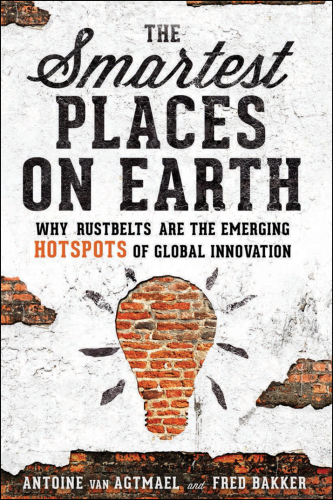
The Smartest Places on Earth
Why Rustbelts Are the Emerging Hotspots of Global Innovation
کتاب های مرتبط
- اطلاعات
- نقد و بررسی
- دیدگاه کاربران
نقد و بررسی

February 8, 2016
Warren Zevon’s call to “send lawyers, guns, and money” could be Teitelman’s anthem for the mergers and acquisitions heyday of the mid-1970s and ’80s. Corporate raiders, armed with junk bonds, attorneys, and sheer brio, targeted corporate giants and felled them. It’s a great story, with profound implications for the way America views and regulates corporations. Teitelman shows that corporations were not always regarded as the sole property of shareholders. As recently as the 1960s, courts (and the overall culture) regarded corporations as having multiple stakeholders: management, employees, suppliers, and customers. This view was steadily eroded during takeover battles, as maximizing shareholder value became management’s principal responsibility. Teitelman chronicles this history exhaustively, showing how contemporary social issues, such as the disparity in pay between CEOs and workers and Wall Street’s responsibilities to Main Street, hearken back to this era. Teitelman has a masterly command of his subject, yet he sometimes sacrifices clarity in favor of a jocular, hyperbolic writing style more akin to Rolling Stone than the New Yorker. But this is a minor flaw in this comprehensive look at corporate takeovers. Agent: Carol Franco, Kneerim, Williams, and Bloom.

January 25, 2016
In their debut work, journalist Bakker and international finance expert van Agtmael team up to show how onetime rust-belt areas in the U.S. and Europe are emerging as new centers for innovation. After observing examples of this phenomenon, they set out to understand it, with the idea that perhaps “making things as smart as possible,” rather than “as cheap as possible,” might be the way of the future. Through extensive travel to places ranging from the SUNY Polytechnic Institute’s Nanotech Multiplex in Albany, N.Y., to Akron, Ohio, to Dresden, Germany, to Eindoven, Netherlands, they discovered common themes among these unlikely “brainbelts.” These include innovation sharing between research universities and corporations, physical spaces that encourage collaboration, and environments that attract talent. The authors make a strong case that a renaissance in the development and manufacturing of “chips, new materials, and biosciences” is happening not in tech or major urban centers, but in reclaimed factories and settings like the revitalized American Tobacco Campus in the North Carolina Research Triangle. For anyone looking at trends in technology or manufacturing, or at the future of global business, this insightful work will provide food for thought.

January 15, 2016
An economist/public policy adviser and a financial journalist envision a transformative resurgence in industrial regions that had threatened to rust from within. Van Agtmael and Bakker find hope where others have seen decades of decline, as cities from Akron to Dresden have awakened from industrial obsolescence. "That's because, like the fairy-tale Sleeping Beauty," write the authors, "they have lain dormant for a long time--doomed to a state of inertia by the evil witches of policy or (lack of) leadership or faulty analysis--and have been given up for lost by entrepreneurs and investors." Continuing with the fairy-tale motif that (thankfully) doesn't pervade the rest of the book, they write, "the awakening beauty develops new capabilities, particularly the ability to adapt to new circumstances and to refocus its energy on new areas of activity." No, the old jobs are never coming back, and the old factories will billow their smoke no more, but there are now collaborations between corporations and universities, an embrace of technology, and a shift from the primacy of a traditional liberal arts degree toward "vocational training, which...had almost disappeared, especially in the United States." All of these changes have accompanied a global shift in emphasis from cheap labor and products toward "making things as smart as possible," with quality and ingenuity. Van Agtmael was principle founder of Emerging Markets Management, and Bakker is a Dutch journalist and editor specializing in financial affairs. Though the former, also born in the Netherlands, has lived in the U.S. since 1968, the perspective here on the transformation of "rustbelts" into "brainbelts" has an outsider's freshness toward America and an international expansiveness. The authors acknowledge areas of concern, such as monopolization and loss of privacy from consolidated data, but they suggest that the rewards far outweigh the risks. Akron glitters like never before in these illuminating pages.
COPYRIGHT(2016) Kirkus Reviews, ALL RIGHTS RESERVED.

February 15, 2016
This book by investment professional van Agtmael and financial journalist Bakker is about so-called "brainbelts," i.e., rust belts that have revived owing to collaborations among companies, colleges, and other entities. Brainbelts focus on complex products rather than cheap ones. According to the authors, the industries involved are chips and sensors, life sciences, or new materials. The partnerships are born of necessity to energize a locality and are made possible by the participants focusing on specific products and services, and thus not competing with one another. Visiting a number of brainbelts in the United States and Western Europe as well as researching others, the authors provide descriptions and analysis, pointing out similarities and differences among the various communities. The narrative tone tends toward breathlessly enthusiastic, which can become tiresome. Despite this, the book contains an abundance of insightful information. Near the end the authors seem compelled to address broader issues such as job loss and privacy concerns regarding the vast accumulation of customer data that is typically a part of brainbelts. This section is relatively weak and lacking depth. VERDICT This is a strong selection for those interested in high-tech industries or community economic revival.--Shmuel Ben-Gad, Gelman Lib., George Washington Univ., Washington, DC
Copyright 2016 Library Journal, LLC Used with permission.

























دیدگاه کاربران